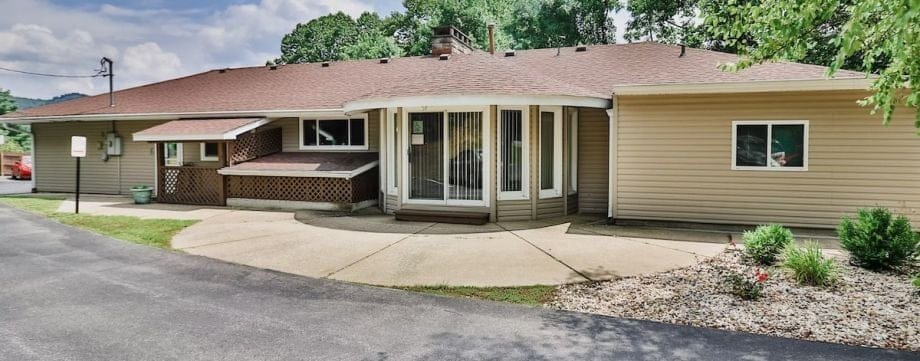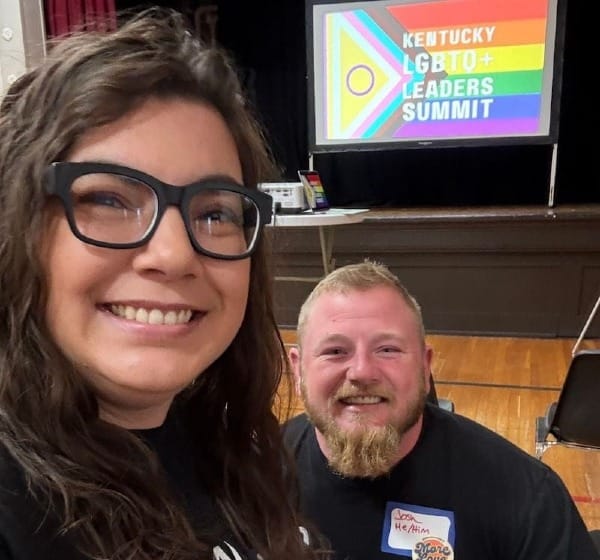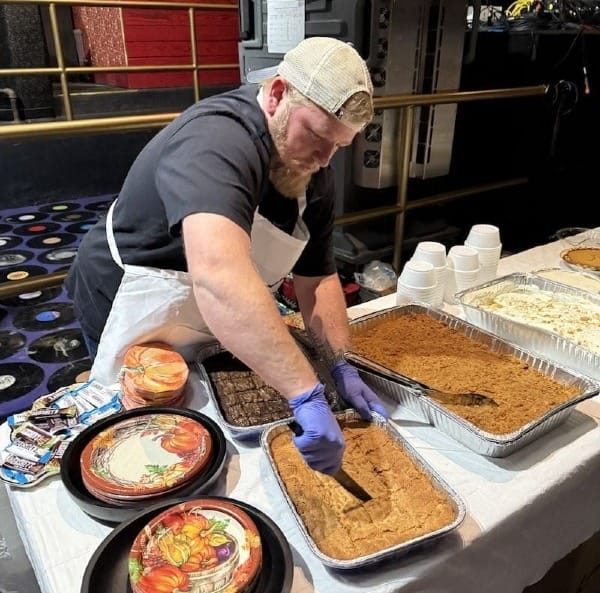Climate disasters cost billions. What is Central Kentucky's plan?
The Central Kentucky Climate Action Plan combines the efforts of urban and rural municipalities to push for climate action.
Cities like Lexington and Louisville have comprehensive reports and task forces dedicated to housing needs. But statewide statistics suggest homelessness is rising at a higher rate outside of its cities, in growing areas like Ashland and Morehead.

This story was produced as part of a joint Equitable Cities Reporting Fellowship for Rural-Urban Issues between CivicLex and Next City.
In many U.S. cities, advocates for America’s growing homeless population say, homelessness itself is being treated like a crime.
Last year, the Supreme Court gave cities the green light to ban people from sleeping and camping in public, allowing them to crack down on encampments even when there are no shelter beds available. In July, the White House announced an executive order making it easier for cities and states to remove unsheltered people from the streets and force them into medical facilities and institutions. That headline came alongside news of broad, Trump-backed encampment sweeps in Washington, D.C. and the threat of federal mobilization in other big cities.
But Kentucky’s experience since passing House Bill 5 – sometimes called the ‘SAFER Kentucky Act’ – last year shows that cracking down on public homelessness doesn’t end it. It just makes it harder to see and harder to solve.
“Oftentimes, rural homelessness is invisible compared to urban homelessness, and we especially see that one year after H.B. 5,” says Marilyn Smith, executive director of the Gateway Homeless Coalition, which runs a shelter called Gateway House in Morehead. “Homelessness manifests in several different ways – couch surfing with friends or family, living in vehicles or substandard housing, staying in motels or hotels or other temporary sheds. Places that aren’t meant for human habitation.”
H.B. 5 introduced harsher punishments for repeat violent offenders and criminalizes the act of ‘street camping’ or possessing ‘camping paraphernalia’ like sleeping bags. Supporters say it aims to decrease violent crime and enforce clear regulations for people on the streets. Critics say it replaces support with persecution and jail time.
Hundreds of people have been cited for unlawful camping across the state since H.B. 5 was enacted. And homelessness in the Commonwealth has gone up about 10% from January 2024 to January 2025, especially in the state’s rural areas.
Facing increasingly aggressive enforcement, unsheltered people are being pushed into hiding, advocates say – especially in rural areas. In small towns like Morehead, local shelters and outreach nonprofits are encountering even more difficulty finding and building relationships with the people they are meant to serve.
Officials have coined the term invisible homelessness to talk about the not-as-obvious ways people without a permanent home can survive day to day. In Morehead, homelessness rarely looks like eyecatching pictures of tents in alleyways and panhandlers at intersections, though those circumstances exist too. Every case is different, Smith says, so there’s no one-size-fits-all solution.
Gateway House offers shelter and supportive services — food, case management, referral services, job readiness training, life skills training and more — for individuals experiencing homelessness in Rowan and the other four counties in the Gateway Area Development District. The total service area spans more than 1,300 square miles, all rural.

Gateway Homeless Coalition relies on other community members to let them know where and how to find the people they serve. Then, it’s a matter of building trust.
Smith says those conversations, a pillar of her work, have been made harder by increasing criminalization.
“They say, ‘Who are you and why are you asking me? I don’t know you, I don’t trust you, I don’t have any rapport with you, so I’m not telling you that because are you going to call the law on me?’”
That extends to potentially life-saving medical care. The Gateway Homeless Coalition sets up a weekly clinic in partnership with the University of Kentucky College of Medicine and UK Saint Claire Hospital, providing essential health services to its current residents and those in transitional housing.
But it’s hard to even deliver those services, Smith says, when people are afraid of getting arrested.
“During case management, they’d mention: ‘I was worried that I was going to get arrested. I was worried to tell anybody that I was homeless because I was afraid I would end up in jail. Then I couldn’t get to my court date,’” Smith says. The list grows. “There’s fines associated with that. Then that’s also an arrest on their record, which creates barriers in getting into low income housing or subsidized housing.”
Cities like Lexington and Louisville have comprehensive reports and task forces dedicated to housing needs. But statewide statistics suggest homelessness is rising at a higher rate outside of its cities, in growing areas like Ashland and Morehead.
When Eli Banks became homeless right before they entered college, they didn’t have to worry about these laws yet. Every day was just about finding somewhere safe.
“I couch surfed with other queer and trans individuals. I found safe places in public to sleep that, under H.B. 5, maybe I would have been arrested for,” says Banks, who now helps lead the Morehead-based nonprofit MoreLove.
In the first year since H.B. 5’s passing, 12 total citations (some repeats) were issued in Rowan County, where Banks now lives with their spouse and children. A citation comes with a court date, fine and potential incarceration.
“If I had gotten arrested during that time,” Banks adds, “the financial hole that would have put me in? It would have been almost inescapable.”
Morehead, Kentucky is a small college town with about 7,000 permanent residents, outnumbered by a student population of nearly 9,000. It’s a commerce hotspot for all of its surrounding counties, containing the only Walmart for miles. Its closest urban cities are Lexington an hour west and Ashland (right across the river from Huntington, WV) an hour east. Nestled in the Daniel Boone National Forest, Morehead is home to various small businesses, a regional university, and what some residents call a ‘hometown atmosphere.’
It also faces a staggering housing shortage. Rowan County lacks more than a thousand units, according to the county's economic development council. As residents are priced out with nowhere else to go, they’re left extremely vulnerable to homelessness.
“It’s very common to be teetering on the edge of homelessness when you're a tenant right now,” says Emma Anderson, a lead organizer for Kentucky Tenants. “Then legislation like H.B. 5 [is] actually adding barriers to then getting out of homelessness. It's building a criminal record for people who just got screwed over by the system.”

Anderson says Morehead faces unique challenges as a growing rural area.
“Morehead has a lot of problems around monopolization,” Anderson says. “Some people have to leave town because there are three people who own most of the properties.” While landlord monopolies are also a problem in Lexington and other urban areas, they add, it’s especially glaring in a town where everyone knows everyone.
Kentucky Tenants is a member-led group, bringing together renters to advocate for change. They have previously focused on policy reform and recently expanded to supporting complex-wide tenant unions. The organization has two chapters, one in Lexington and one in Morehead.
Anderson was suddenly evicted and became homeless in 2021. No matter the setting, rural or urban, they say citations and fines can quickly spiral out of control.
“It was simple as, I got a speeding ticket and the papers went to the address I'd been evicted from, but I didn't have another permanent address to forward it to because I was sleeping on my friend's couch. I almost lost my license ‘cause I didn't go to court,” Anderson says.
Josh Alfrey, founding member and president of the emerging organization MoreLove, says he was fortunate to find Gateway House when he did.
“I got kicked out of my family's farm and stayed a little bit at an extended stay hotel, but that's just not feasible. [I] checked out the Gateway House here in Morehead, and luckily, they had beds open and it was well needed. They didn't judge.”
Gateway House helped Alfrey get on his feet and provided continuing support for his journey. He built independence and life skills with chores around the shelter, and when he found a place to rent, Gateway also contributed to his deposit and furniture so he could sustain that progress.
Alfrey and Banks both grew up in much more rural towns southeast of Morehead, so when they arrived for college, they thought it would be a much more progressive place than it is in reality.
“The hospitality doesn't go far. Everybody's threatened of somebody trying to help,” Alfrey says.
That’s part of why they went on to establish MoreLove.
MoreLove is a nonprofit focused on inclusive outreach and community-building within and around Morehead. Banks says their work is meant to support everyone, but the outreach is especially vital for their overlooked communities.
“Things like support groups, clothing allocation projects. We use compassionate action, which is fun, to draw people in so they can learn about our services – which is also something that's really helpful for the unhoused population.”
The mission began with a free, inclusive Thanksgiving dinner in 2024, where volunteers served food to more than 260 people of all backgrounds. They’re gearing up for an even bigger event for 2025. Now, MoreLove hosts monthly ‘chosen family’ hangouts, distributes care supplies like hygiene products and overdose prevention kits, and works directly with people facing homelessness. Again, Banks says every situation is unique.
“One gentleman was arrested, [and] during the summer he had on shorts. He got out during the winter, and he still only had shorts. Our program was able to provide him with enough clothing to get him through, to find a temporary – and then a stable – housing situation,” Banks says.
Like Gateway House, MoreLove is also hit hard by H.B. 5.
“Being rural means that a lot of our homeless and unsheltered people are places where we literally can't reach them,” Banks says. “They don't pass us on the street. They don't see our flyers in soup kitchen windows because that isn't here. They're probably somewhere in the woods, or they're somewhere in an abandoned barn, where they might not come into town to even learn about services that homeless shelters could provide.”

State and federal policy create an increasingly hostile world for homeless people in Kentucky, but these organizations are pushing onward. MoreLove continues to provide aid and support to the people it can reach.
In their eyes, that means advocates need to talk to lawmakers, churches need to talk to libraries, and people must connect with one another– even amid fear.